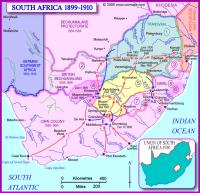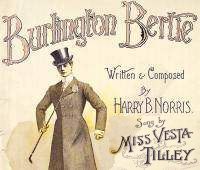- at gaze — in wonder, bewilderment. ((OED.))
- of an old Irish morning — ? on this fine day, on this morning with "typically Irish" weather.
- hayfoot, strawfoot — "left, right!" as in military marching. (("in allusion to the alleged use of hay and straw to enable a rustic recruit to distinguish the right foot from the left" – OED.)) stand and freeze — punning "stand at ease". ((military jocular – Partridge HS.)) at the steady — punning "at the ready", the military order.
- Queen's bad bargain — (("a recruit who turns out a bad soldier" – Ware 1909.))
- present arms — punning the military order and the offering of a hand for a handshake.
- paw — hand. ((colloquial – Partridge HS.))
- quarterbloke's bloke — quartermaster's man, presumably meaning the "quartermaster sergeant". ((quarter bloke: quartermaster military colloquial, since mid-C.20 at latest – Partridge.))
- Dubs — Royal Dublin Fusiliers
- me old sweat — my old comrade. ((old sweat: "an old soldier" military – Partridge HS.)) me old heart — my old friend. ((heart: "used as a term of endearment" – OED.))
-

- Pete'n'Marysburg — Pietermaritzburg, city in Natal province, South Africa. The 2nd battalion RDF had been stationed here since 1897. October fourteenth ... — hostilities in the Boer War had started two days earlier, October 12 1899.
- setting off for Ladysmith — Ladysmith, a town in the interior of Natal province, was the scene of the first British losses in the Boer War.
- take the stick — be the smartest soldier on parade. ((get the stick: "to be, as the most smartly turned out man, excused guard duty and made the guard's orderly" Regular Army colloquial – Partridge HS.)) (("for it was now his high ambition to 'get the stick'—in other words to be dismissed from guard-duty as reward for being the best-turned-out man on parade" – Percival Christopher Wren, Snake and Sword, 1914.
- gave a swank — flaunted. ((swank: "ostentatious or pretentious behaviour" slang – OED.))
- margarine smile — ? insincere smile (as margarine is an imitation of butter). cf < Ch1.1.
- natty — smart. (("neat, tidy, spruce" – Farmer 1904.))
- parish by the sea — a local name for Glasthule parish.
- dog's lady — his wife, disrespectfully. (("jocular way of calling a woman a bitch" colloquial – Partridge HS.)) grawls — one's children. ((PWJ 1910.))
- be the cut of you — by the look of you. ((cut: "appearance" – Slanguage.))
- jawing — chattering. ((Partridge HS.))
- Hurrah, hurrah for Ireland! — from the regimental song of the Dublin Fusiliers. (("Listening, mayhap, to the old march-past of the Old Toughs, the Dublin Fusiliers, and shouting out the song himself, Hurrah, hurrah for Ireland, and th' Dublin fu-u-sa-leers!" – O'Casey 3.)) In the 1960s The Dubliners recorded a somewhat updated version. ♫♫
- Burlington Burt — from the music hall song "Burlington Bertie", composed by Harry B. Norris, 1900, performed by the male-impersonator Vesta Tilley. It concerns an aristocratic idler who pursues a life of leisure in the West End of London. The song was parodied in 1914 by the far better known "Burlington Bertie from Bow". ♫♫
- swagger — fashionable, showy. ((colloquial or slang – OED.))
- slob — mud. (("chiefly in Irish use, or with reference to Ireland" – OED.))
- stiffeners — ? similar to "frighteners", as in ((to put the frighteners on: "to intimidate" – OED.))
- scut — ? a past tense of ((scoot: "to go away hurriedly" slang or colloquial – OED.))
- blow the gab — betray, spill the beans. (("to blab, give information" slang – OED.))
- young 'un — young one. (("a child; a youth (rarely a girl)" low colloquial – Partridge HS.))
- slatey — foolish. (("slightly mad; crazy" Irish informal – Collins.))
- touch — ? soft touch. ((touch: "the obtaining of money from a person, e.g. by a loan" – Partridge HS.))
- in tow — accompanying, following him. ((OED.))
- cross-patch, draw the latch ... — from the nursery rhyme (("Cross patch, draw the latch, / Sit by the fire and spin; / Take a cup and drink it up, / Then call your neighbours in" – Brewer 1898.)) ((cross-patch: "a cross, ill-tempered person. Usually applied to a girl or woman" – OED.))
- first shake of the bag — ? his wife's first child. (the idiom usually refers to a woman's last child.) ((shake of the bag: "runt of the litter; unprepossessing person" – Slanguage.)) ((shake of the bag: "a woman's last child" – DILR.)) (("This had been the shake of the bag, and she knew she would never have another child" – O'Casey 1.))
- your humble — myself. (("used elliptically for 'your humble servant'" – OED.))
- sodgering — soldiering. <
- mustard — ? echoic of "bastard". nettlebed — (("a traditional put-off used since the early 17th century when children ask where babies come from" – Oxford Dictionary of English Folklore, 2000. (("In folklore little girls come from the parsley-bed, little boys from the nettle-bed" – Partridge.))
- rag-mannered — coarse. (("violently coarse or vulgar". colloquial – Partridge HS.))
- baldy peelo — (("jeer at child with head shaved on account of ringworm, etc" – Slanguage.)) the itch — (("any of various skin disorders, such as scabies, marked by intense irritation and itching" – Stedman's Medical Dictionary.))
- sketch — a ridiculous sight. ((slang – OED.))
- clocked him — noticed him. An anachronism. ((clock: "to catch sight of or notice someone or something" US, 1929 – Routledge Slang.))
- the well ever dried for the thirsty — ? proverbial.
- buzzard — bastard. (("a worthless, stupid, or ignorant person. Also used euphem. = bastard" – OED.))
- Benevolent Fund — ? a regimental charity for old soldiers.
- Bojer — a Boer soldier (("English soldiers' slang in the South African War" – Partridge.))
- devil the chance — no chance at all. (("expressing strong negation: as 'the devil a bit', 'the devil a penny' – OED.))
- dodge — (("a shifty trick, an artifice to elude or cheat" – OED.))
-

- the lend of a loan — the habit of borrowing. Common phrase in Ireland. (("it's what I wanted, my lady, is the lend of a loan of two-and-sixpence" – Anna Maria Hall, Stories of the Irish Peasantry, 1840.))
- feel the miss of — (("to feel the lack or the loss of" colloquial – Partridge HS.))
- took the ape off his back — ? gave the appearance of calm. ((to have a monkey on one's back: "to be angry or enraged" obsolete – OED.))
- Glenageary — uphill townland bordering Glasthule. Ballybrack: a village some 4 miles south.
- cara macree — anglicized form of Irish cara mo chraoi, lit. "friend of my heart".
- pricked their palms ... — the ceremony of becoming blood brothers (("two individuals who vow mutual fidelity and trust by a ceremony involving the mingling of each other's blood" – American Heritage Dictionary.))
- great — intimate, closely acquainted. ((PWJ 1910.))
